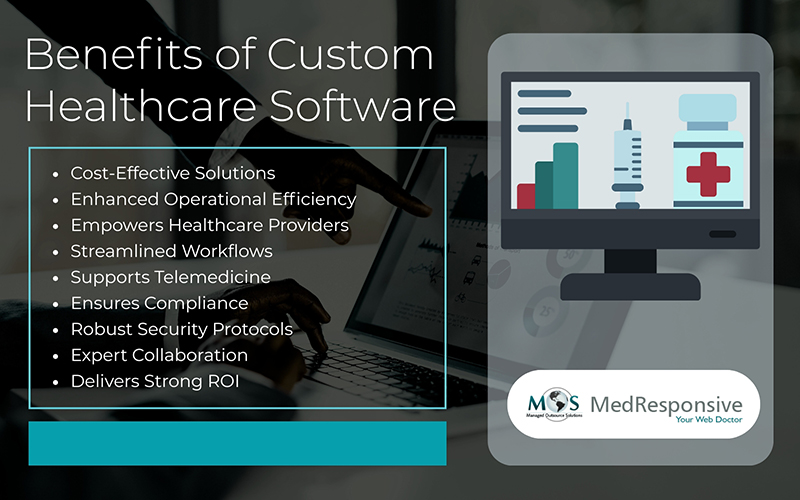In an era where digital transformation is reshaping every industry, healthcare is no exception. The global healthcare IT market is projected to surge from $394.6 billion in 2022 to $974.5 billion by 2027, according to Markets and Markets. This tremendous growth reflects the increasing demand for custom software solutions for healthcare that are innovative, scalable, and adaptable to both clinical and operational needs. At the core of this evolution is the rising reliance on custom software development company services, which provide bespoke tools to improve care delivery, enhance data security, and streamline administrative processes.
Unlike off-the-shelf solutions, custom software development offers healthcare providers the ability to build applications tailored precisely to their unique requirements. These customized solutions are helping institutions solve specific challenges, optimize processes, and provide more personalized and efficient patient care.
The Rise of Custom Software Solution for Healthcare
Generic software, though widely available, often lacks the depth of customization needed for the complexities of modern healthcare. From multi-specialty hospitals to niche clinics, each facility faces unique operational and clinical demands. This is where customized software solutions become vital.
Customized applications are developed based on an organization’s workflow, existing infrastructure, regulatory obligations, and patient demographics. Whether it’s for scheduling, diagnostics, billing, or clinical data tracking, these solutions align perfectly with the provider’s goals, enabling smoother operations and better outcomes.
Addressing the Unique Challenges of Healthcare Providers
Healthcare is one of the most complex and regulated industries in the world. Healthcare professionals work under immense pressure to deliver timely, accurate, and efficient care. Every second counts, especially in emergency scenarios or high-stress environments. A one-size-fits-all software approach often falls short when faced with the diverse needs of healthcare institutions. For instance, a large urban hospital may need software capable of managing high patient volumes and complex departments, while a rural clinic may prioritize telehealth capabilities.
Custom medical applications bridge this gap by offering specialized tools to manage tasks like patient record management, treatment tracking, and appointment scheduling. These applications can be integrated with legacy systems or newly implemented platforms, making them highly adaptable and effective. Moreover, they ensure that healthcare providers are not forced to adjust their workflows to fit into a rigid software structure, instead, the software adapts to the workflow. This helps with improving the clinical efficiency with custom software.
By automating repetitive tasks and organizing workflows, custom software allows medical staff to focus more on patient care and less on administrative burden. For instance, real-time patient monitoring systems can flag abnormal vitals immediately, allowing for faster intervention. Similarly, digital prescription tools can reduce errors and streamline communication between physicians and pharmacies. This results in faster decision-making, better patient experiences, and improved healthcare outcomes.
Benefits of Custom Healthcare Software

- Cost-effective Solutions Tailored to Specific Needs: Custom healthcare software focuses only on essential features needed by an organization, eliminating unnecessary functionalities. While the initial investment may be higher than standard software, it leads to long-term savings by reducing the need for third-party tools. These tailored solutions also cut costs related to upgrades, licensing, and integrations. Over time, healthcare institutions benefit from smoother operations and more efficient resource management.
- Improved Operational Efficiency and Reduced Administrative Burden: Custom software automates repetitive tasks like billing, patient records, and appointment scheduling, reducing manual workload. This type of clinical workflow automation ensures accuracy and speed, allowing staff to focus more on patient care. It also minimizes administrative errors and saves time for both staff and patients. Overall, it significantly improves the efficiency of day-to-day healthcare operations.
- Empowering Healthcare Providers to Deliver High-Quality Care: Tailored software equips healthcare professionals with the tools they need to manage treatments, access patient histories, and collaborate effectively. By integrating systems like EHRs and clinical decision support tools, providers can make more accurate diagnoses. These systems also help with predictive analytics, enhancing care quality and outcomes. Ultimately, custom solutions enable a more responsive and informed care environment.
- Streamlined Operations and Improved Patient Outcomes: Custom solutions bring together various healthcare functions—EHRs, billing, lab results, and telemedicine—into one cohesive platform. This integration enhances communication and reduces delays in care delivery. Providers can access real-time data, monitor patient progress more closely, and make faster decisions. The result is more coordinated care and better patient experiences.
- Supporting Telemedicine for Remote Consultations and Continuous Care: Custom healthcare software can incorporate telemedicine features like video calls, messaging, and remote monitoring tools. This expands access to care, particularly in remote or underserved areas. It enables continuous management of chronic conditions and post-operative recovery without requiring in-person visits. Providers can stay connected with patients and intervene promptly when needed, improving health outcomes.
- Compliance with Healthcare Standards: HIPAA, HITECH, GDPR, and 21 CFR Part 11: The importance of secure custom software in healthcare cannot be overstated. Custom healthcare software is built to meet strict industry regulations and data privacy laws. It ensures compliance with standards like HIPAA, GDPR, and 21 CFR Part 11, protecting sensitive patient data. This reduces the risk of legal penalties and reputational harm. Organizations benefit from secure systems that maintain trust and operate within legal boundaries.
- Robust Security Measures and Regular Audits: Data security is a top priority, and custom solutions offer features like encryption, access control, and audit trails. These systems are specifically tailored to protect healthcare data from unauthorized access and cyber threats. Routine security audits help detect vulnerabilities and keep the system updated. This proactive approach ensures ongoing compliance and data protection.
- Collaboration with Legal and Compliance Experts for Adherence: During development, legal and compliance experts are often involved to ensure the software meets evolving regulations. This collaboration ensures that updates and features remain within legal frameworks. Custom software can adapt quickly to new laws without disrupting operations. Healthcare providers stay protected from legal risks while maintaining up-to-date compliance.
- Return on Investment (ROI) and Competitive Advantages: Though custom solutions may require a higher upfront investment, they deliver strong long-term returns by enhancing operational performance and reducing inefficiencies. Features tailored to an organization’s specific needs give providers a unique edge over competitors. Higher patient satisfaction, better retention, and increased trust follow. Ultimately, it leads to improved profitability and a stronger reputation in the healthcare market.
Building Success from Scratch: The Benefits of Custom Software Development for Businesses
From healthcare software development to personalized medical applications, the benefits of personalized digital tools are far-reaching. Whether you’re aiming to enhance patient experiences or streamline internal processes, the right custom solution can transform your approach and your outcomes. Partnering with a custom software development company that specializes in healthcare can open new doors for innovation, personalization, and operational excellence. Whether it’s improving patient engagement, reducing errors, or increasing ROI, the value of customization is clear and measurable.




